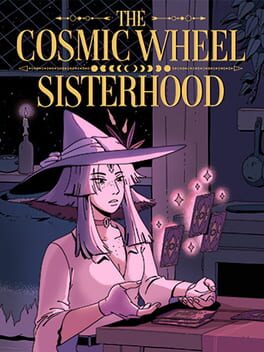the lore and worldbuilding is grounded in a hyperreal, new age mysticism that is abstracted away from any real history and esotericism of witchcraft, tarot, etc., presenting an admittedly charming pastiche of these things instead. on the one hand, this produces a wonderful aesthetic, with the character designs being a particular standout. i vibed with it; it was fun and whimsical when not taken too seriously, and the card designer, tarot reading, and canvassing were novel and enjoyable mechanics, although they did feel somewhat underdeveloped.
however, this grounding also lends itself to some mawkish writing and convoluted explain-aways. when it came to points of commentary or emotional depth, the dialogue often became noticeably more awkward, jarring and inconsistent. a decontextualised mysticism is inevitably going to be limited on topics of gender, friendship, politics and power i suppose
however, this grounding also lends itself to some mawkish writing and convoluted explain-aways. when it came to points of commentary or emotional depth, the dialogue often became noticeably more awkward, jarring and inconsistent. a decontextualised mysticism is inevitably going to be limited on topics of gender, friendship, politics and power i suppose
3 Comments
@Palas you make an excellent point on the usefulness of a hyperreal approach to this sort of game and it works for the game's system of magic itself for sure. however, for me, it is not so much an ontological convergence that is produced but an ontological confusion, where instead of a singular, unified reality to escape to, it produces a scenario where distinctions between the fantasy of the game and my reality as a player are fumbled with. this fumbling is most pronounced when the scenario is challenged by the narrative’s engagement with nuanced topics such as friendship or politics. here the game had a frustrating tendency to defer to platitudes of the “real” world while awkwardly keeping up appearances of its decontextualised mysticism. this does more to dampen than enhance the prospective excitement of the game’s premise, punctures the self-containment of the phenomenological singularity you refer to and ultimately breaks the immersion for me. i think a lot of this comes from the inherent baggage of anything becoming hyperreal
i feel more of an active initial effort to seek out the real and ground the lore and worldbuilding in some history of esotericism/mysticism would have strengthened the game’s abstractions and made for more compelling insights into its themes, with the narrative and overall immersion benefitting as a result.
i feel more of an active initial effort to seek out the real and ground the lore and worldbuilding in some history of esotericism/mysticism would have strengthened the game’s abstractions and made for more compelling insights into its themes, with the narrative and overall immersion benefitting as a result.
@tc_sometype I'm inclined to agree that a grounded lore and a historical basis for magic would have made for a more substantial narrative. I think it might have especially prevented the game's ending from folding in on itself. But I think it was a valiant effort to emphasize self-expression in the proposed world nevertheless. It's a very... modern tendency, I guess, which the game's prose doesn't try to hide either, but it's not one I dislike. It created that sense of wonder in me -- "what would I like to use as magic if I ever ascended?" and all that, and I appreciate the game for it from another angle.

Palas
1 month ago